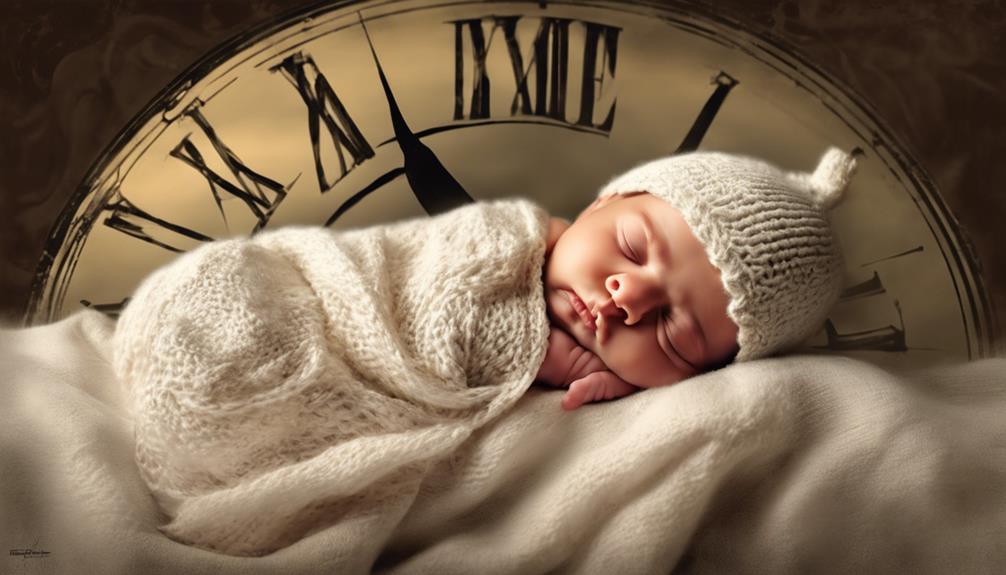As new parents, maneuvering the world of newborn sleep can feel like deciphering a complex puzzle; however, understanding if your newborn's all-day slumber is within the essential of normality is vital for your peace of mind.
Have you ever wondered how much sleep is too much for a newborn? Understanding the nuances of newborn sleep patterns to guarantee your little one's well-being, but where do you begin when faced with a baby who seems to snooze around the clock?
Let's explore the telltale signs and factors that shed light on the mystery of your baby's sleep habits.
Key Takeaways
- Newborns sleeping all day, up to 18-19 hours, is normal.
- Short 2-4 hour sleep bursts are common in newborns.
- Waking every 2-3 hours for feeding is typical for newborns.
- Irregular sleep cycles and napping throughout the day are expected in newborns.
Newborns' Sleep Patterns Variation
Newborns exhibit a wide range of sleep patterns, with some sleeping as much as 18-19 hours a day. It's common for babies to have irregular sleep cycles, often snoozing in short bursts of 2-4 hours. These little ones don't follow a strict schedule initially, so their sleep patterns can vary.
They might be restless sleepers, making noise while they rest, which is perfectly normal for newborns. Background noise, like gentle music or white noise, can even be soothing and help them drift off peacefully. Understanding that these variations in sleep patterns are typical for newborns can ease any worries parents may have.
Embracing the uniqueness of your baby's sleep habits is part of the journey of getting to know and care for your little one. Just remember, each baby is different, and what matters most is that they're getting the rest they need to grow and develop.
Recognizing Normal Newborn Sleep Duration

In the early stages of life, infants typically sleep for 14-17 hours each day, adjusting their sleep duration based on their needs for nourishment and comfort. Newborns may sleep up to 18-19 hours due to their developmental requirements. Their sleep patterns are often irregular, with short spurts of sleep being common as they wake every 2-3 hours for feeding. These short bouts of sleep are vital for their nourishment and growth.
It's normal for newborns to have no set schedule for sleep, alternating between day and night rest. As they grow, they gradually shift to longer stretches of sleep. Monitoring the total daily sleep duration can help determine if their sleep falls within the normal range. Additionally, ensuring frequent feeding is essential to support their sleep needs and overall well-being. By observing these patterns and behaviors, caregivers can better understand and support their newborn's sleep needs.
Factors Influencing Newborn Sleep

Factors influencing newborn sleep patterns include various developmental milestones, external stimuli, and individual differences in needs and responses. Newborns have irregular sleep patterns due to their developing brains, leading to short sleep cycles. Growth spurts, feeding difficulties, or illness can contribute to increased sleep duration in newborns.
It's essential to monitor for signs of excessive sleep, such as missing feedings or unusual lethargy, to assess whether it's within normal limits. While newborns may sleep up to 19 hours a day, consistent excessive sleep should prompt evaluation by a pediatrician to make sure the baby's well-being.
Understanding these factors and being vigilant in monitoring your newborn's sleep can help you recognize any deviations from the norm and seek appropriate medical advice when needed. Prioritizing your baby's sleep patterns and seeking professional guidance when in doubt are vital steps in promoting your newborn's health and development.
Signs of Healthy Newborn Sleep

Understanding the signs of healthy newborn sleep is important for parents to monitor their baby's well-being and development. Babies typically sleep 14-17 hours a day, usually in short 2-4 hour bursts. It's common for newborns to wake every 2-3 hours for feeding, indicating a normal sleep pattern.
Newborns often don't sleep through the night and may have irregular sleep cycles. Napping at various times throughout the day and night is also normal for newborns. Keeping track of your newborn's sleep patterns can provide valuable insights into their health and development.
While most variations in sleeping habits are normal, if you notice excessive sleep or have concerns about your baby's sleep behavior, consulting a pediatrician is recommended to address any potential issues and assure your baby's well-being.
Seeking Professional Advice for Newborn Sleep

When should parents consider seeking professional advice for their newborn's sleep patterns? It's important to consult a pediatrician if you have any concerns about your baby's all-day sleep habits. Here are some reasons why seeking professional advice for newborn sleep is essential:
- Assessing Normalcy: Pediatricians can evaluate your baby's sleep patterns and determine what's considered normal for their age.
- Addressing Excessive Sleep: If you notice your newborn sleeping excessively throughout the day, it's advisable to seek professional advice to rule out any underlying health issues.
- Ensuring Well-being: Professional advice is crucial to safeguard your baby's well-being and address any worries you may have regarding their sleep.
- Identifying Concerns: Medical professionals can help pinpoint any potential sleep-related concerns early on to ensure the best care for your little one.
Frequently Asked Questions
Is It Normal for Newborns to Sleep Almost All Day?
Yes, newborns sleeping almost all day is normal due to their small stomachs and rapid growth. They sleep in short bursts throughout the day and night. Monitoring weight gain, feeding frequency, and development helps make sure their sleep is within normal ranges.
How Do I Know if My Baby Is Getting Too Much Daytime Sleep?
We observe a baby's behavior, feeding, and weight gain to gauge if excessive daytime sleep is concerning. If your baby sleeps more than 19 hours a day, consulting a pediatrician is wise.
How Do I Know if My Newborn Is Sleeping Well?
We observe our newborn's sleep by monitoring total hours slept, looking for regular feeding cues, noting contentment when awake, and tracking weight gain. If concerns arise about sleep patterns or excessive sleepiness, we consult our pediatrician.
What Is the Normal Sleep Behavior of a Newborn?
Newborns typically sleep for 14-17 hours a day, with variations up to 18-19 hours. Their sleep is in short bursts to accommodate feedings. Understanding newborns' sleep patterns is important for their well-being.
Conclusion
To guarantee understanding our newborn's all-day sleep patterns can be a source of reassurance and peace of mind. Like a gentle breeze rocking a cradle, their sleep is a natural and crucial part of their growth and development.
By recognizing the signs of healthy sleep and seeking guidance when needed, we can make sure our little one is thriving and well-rested. Embrace the beauty of their sleep, knowing it's a key ingredient in their journey of discovery and wonder.









